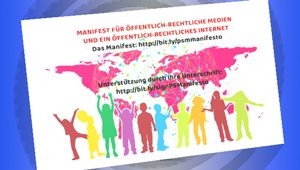Public Service Internet Manifesto
Back
The Public Service Internet Manifesto

200 international media experts published an alarming wake-up call to media policy in June 2021, calling for a public service internet.
"The Internet and the media landscape are broken. The dominant commercial Internet platforms endanger democracy. They have created a communications landscape dominated by surveillance, advertising, fake news, hate speech, conspiracy theories, and algorithmic politics that tailors and personalises commercial and political content according to individual tastes and opinions. As currently organised, the Internet separates and divides instead of creating common spaces for negotiating difference and disagreement." (excerpt from: "The Public Service Media and Public Service Internet Manifesto").
An international group of media experts has therefore created a media and internet manifesto. The "Public Service Media and Public Service Internet Manifesto" published calls for the safeguarding of the existence, independence and financing of public service media and the creation of a public service internet.
Prof. Christian Fuchs, Director of the Institute for Communication and Media Research at the University of Westminster in London and co-initiator of the manifesto:
"Democracy needs public service media and a public service internet. The digital giants like Facebook, YouTube/Google, Netflix and Amazon dominate the internet. The consequences are monopolies, data surveillance, algorithmic politics, digital populism, the internet as a giant shopping mall, filter bubbles, fake news, a post-factual culture and a lack of diverse debate. Our manifesto calls for the creation of a Public Service Internet so that public service media are enabled and properly resourced to provide online platforms that have a public good digital mandate to promote information, news, debate, democracy, education, entertainment, participation and creativity through the internet."
The manifesto was created by a group of international media experts in an online discussion and cooperation process lasting several months on the Austrian platform ecomitee.com. The manifesto initiative is part of the research network "InnoPSM: Innovation in Public Service Media Policies", funded by the UK Arts and Humanities Council and led by Dr. Alessandro D'Arma from the University of Westminster and Dr. Minna Horowitz from the University of Helsinki.
Dr Klaus Unterberger, Head of Public Value - Department at ORF and co-initiator of the manifesto:
"Public communication is more than a business model. It is a public task. The global pandemic, accelerating climate change and increasing social inequality have shown the urgency of reliable and trustworthy information beyond fake news and polarisation. We need a new internet that provides a public sphere for people who are not only media consumers but first and foremost citizens. The existing infrastructure of public media must play an important role in creating an alternative to the threatening dominance of data corporations in public communication. A new, democratic internet is possible. That is why we call for action."
In October 2021, the Public Service Internet Manifesto initiative was signed by
over 1000 supporters worldwide, including
Jürgen Habermas and
Noam Chomsky. If you would also like to support the initiative for a public service internet, you can sign the manifesto here:
http://bit.ly/signPSManifesto
The text of the Public Service Media and Public Service Internet Manifesto:
http://bit.ly/psmmanifesto
Enquiries: Prof Christian Fuchs, University of Westminster, Communication and Media Research Institute
c.fuchs@westminster.ac.uk
Klaus Unterberger,
klaus.unterberger@orf.at
PUBLIC VALUE BERICHT 2024/25
Best of ORF
The current Public Value Report presents a selection of award winners and asked scientists to carry out a public value check. How can media quality be recognised? How does it fulfil the public service mandate? And last but not least: Who benefits from ORF and how?
[more]
All Videos "Best of ORF"
All interviews we conducted with ORF award winners on the occasion of the Public Value Report 2024/25, as well as award-winning contributions, are just a click away.
[more]
What is Public Value?
What does public value mean for ORF? Klaus Unterberger, Head of ORF's Public Value Competence Centre, explains in an interview.
[more]
Best of ORF Daten 2024/25
How does the ORF fulfil its public service mandate? The following facts and figures document ORF's media production. They relate to the calendar year 2024.
[more] (Document only available in German)
Denk|Raum
The Denk|Raum is an offer for young media professionals at ORF. In penal discussions we deal with topics that concern our future: digital transformation, new technologies, innovation, but also corporate culture, transparency, independence and reliability. We talk about the ORF of the future. How we can change it and shape it. [more]
The secret of the colors
ORF Public Value is defined by five quality dimensions and 18 performance categories. They are derived from the ORF Act, the ORF programme directives, the ORF guiding principles and current requirements in the society and media developments.
[more]
